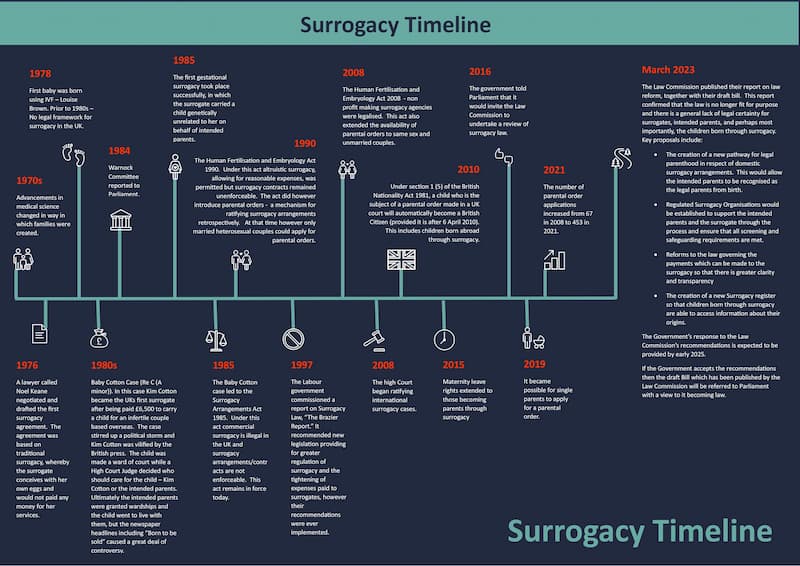The number of parents having a baby via a surrogacy arrangement has quadrupled in the last 10 years.
In light of this recent growth, surrogacy often feels like a modern concept. However, it has always played a role in society and can be traced back to biblical times.
Before the development of artificial insemination and assisted reproduction techniques, the only option available to those experiencing fertility problems was traditional surrogacy whereby the surrogate provides her own eggs to achieve the pregnancy. Conception had to take place the “natural way” through sexual intercourse, which meant that married couples were forced to consider an extra marital sexual encounter and no legal framework was in place to protect the surrogate or the intended parents. Thankfully, things have moved on since then and surrogacy has evolved over the years, marked by changing societal views, legal frameworks, and advancements in medical science.

The era of IVF and gestational surrogacy
In 1978 the first baby was conceived through IVF, Louise Joy Brown. This paved the way for gestational surrogacy, where the surrogate is not biologically related to the child, and facilitated a change in how families were formed. Those previously excluded from parenthood were able to become parents.
Early developments (1980s)
Surrogacy began to gain public attention in the UK during the early 1980s, particularly following the reported case of “Baby Cotton”. Kim Cotton agreed to act as a surrogate for an infertile couple who lived overseas. The case attracted considerable media attention, causing a political and moral storm.
Legal framework (1985 – 1997)
In response to ethical and legal dilemmas surrounding surrogacy, the UK Parliament established the Surrogacy Arrangements Act in 1985. Under this Act, commercial surrogacy is illegal and it is a criminal offence to advertise either for a surrogate or to be a surrogate. Further, surrogacy contracts remain unenforceable.
That being said, altruistic surrogacy arrangements are permitted in the UK, and reasonable expenses can be paid to the surrogate. The surrogate mother will remain the legal mother unless they voluntarily agree to relinquish their parental rights.
The Human Fertilisation and Embryology Act 1990 soon followed. This created a legal mechanism for ratifying surrogacy arrangements retrospectively via a parental order.
The Labour Government subsequently commissioned a report on surrogacy law in 1997. This report was known as the Brazier Report and recommended the creation of a clear legal framework for altruistic surrogacy that would ensure that it was conducted ethically, while preventing exploitation. The report also suggested the introduction of binding surrogacy agreements which would set out the expectations and responsibilities of all those involved. Ultimately, although the Brazier Report influenced future discussions regarding the regulation of surrogacy, the recommendations included in the report were never fully implemented.
A further development then took place with the introduction of the Human Fertilisation and Embryology Act 2008. This Act made it possible for unmarried and same sex couples to apply for a parental order.
Other articles on surrogacy
Ethical concerns and public debate (1990s – 2000s)
Throughout the 1990s and 2000s, surrogacy continued to be a topic of public debate, especially concerning the rights of surrogate mothers, intended parents and the welfare of children born through surrogacy.
The Humans Fertilisation and Embryology Authority (HFEA)
The HFEA, established in 1991, has overseen fertility treatment and research in the UK, including regulations around surrogacy, ensuring ethical practices are followed.
Recent developments (2010s – present)
There has been a shift toward a more inclusive understanding of family structures, and legal recognition of surrogacy arrangements has evolved. The law, however, has not kept pace with the changing landscape in this area and there is growing momentum for reform.
The Law Commission published their report on surrogacy in March 2023. This report provided a comprehensive review of the current law and set out a number of recommendations regarding the regulation of surrogacy. In particular, the Law Commission recommended that the parental order process ought to be simplified and a new legal framework or pathway should be introduced whereby the intended parents could be recognised as the legal parents from birth.
Overall, surrogacy in the UK remains a complex and evolving issue, shaped by advances in reproductive technology, ethical considerations and ongoing legal reform discussions. The focus continues to be on the balancing of the rights of the surrogate, the intended parents and the best interests of the child.
If your thinking about surrogacy and need some early legal advice for surrogacy arrangements, read our latest guidance.
Contact our expert surrogacy lawyers for more information on surrogacy.


